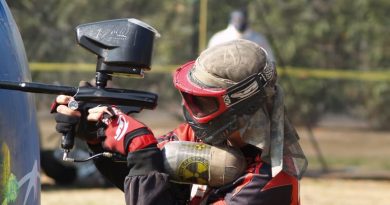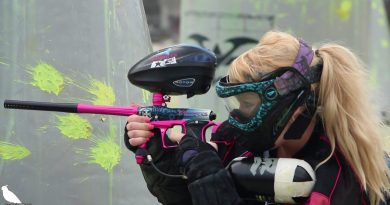Police versus Paintballers
I got a call last fall from a police department in a small town around where I live. Initially, they wanted to meet me and play paintball together. I never turn down such offers.
We played a few friendly recreational games at the local paintball field, when the police chief realized that this game has great training potential for his squad. Afterwards, we discussed a paintball training session for the small town police squad.
Without naming the town, officers or squad, what transpired in the next few weeks was an amazing revelation. We set up a date, I called some local paintball players and rented the proper equipment.
The day began with a basic breakdown of the markers. Everyone was using rental Tippmann 98s. The police squad brought a few members of the local SWAT team to train as well. All in all, we had 16 police officers versus 7 experienced paintball players.
The games were played in a mock-town field and a speedball field. We chose a paintball location that had a more urban theme, in order to replicate real life scenarios.
The first game was played in a town. All the players were limited to only the paint that their hoppers would hold, and one case of 2000 rounds per team at their base. We figured this was an easy way to keep the games fair and exciting.
The initial mission for the police squad was to eliminate the “urban threat”. The threat was the 7 paintball players. It could have been gang members over-running a neighborhood, or a group of madmen demanding ransom in a bank.
The law enforcement team began playing using their radios to contact one another and playing extremely conservatively. They hunkered down and wanted to slowly eliminate the “criminals”.
The criminals, who were fairly decent, experienced paintball players, began with a huge land grab and spread the field. They were screaming out locations and commands to each other. The police force heard them coming and attempted to react.
The police squad initially focused on taking two main bunkers. Both of the sides of the bunkers were open, but they had a strategy of slowly moving up and picking off the paintball players one by one.
The paintballers spread the field and created angles. Eventually, within moments of starting the game half of the police squad was eliminated. Paintball players advanced, took more land and eventually were able to mark all of the police officers.
They quickly realized that you can’t all hide behind the same bunker or two.
The flustered and confused officers regrouped and played another match. This time they did spread out a little more and made some nice advances. They still used their radios to communicate, but they were still playing at a snail’s pace.
The paintball team quickly took advantage of the situation and bunkered a number of police officers. The remaining police officers were confused, but were able to eliminate two of the paintballers. The game ended once again with the paintballers winning handily.
In the lag time between games, the officers asked many questions and discussed strategy with the paintball team. After all, they were here to have fun and learn from one another. One officer casually mentioned, “This is a lot faster paced than we are used to”.
On to the speedball field. The game, once again, was a total elimination match. The police did spread out well this game, but were very hesitant to take any initiative or make any gutsy moves. The paintballers, played slightly conservatively, but did manage to pick off the officers from afar. Once again, the police team did end up losing, but they were able to take out 5 of the 7 paintballers.
“They had the easier side of the field,” said Jeremy, one of the paintball players. But the police team reveled in their apparent progress.
After switching sides, the next game was an intense and quick match. The paintballers decided to up the ante and play aggressively. The paintballers eliminated all of the police squad and only lost 2 players.
Eventually, we mixed up the teams, did some skills training and exercises. Overall, it was a fun and exciting day. The police squad was able to win one game at the end of the day. The final score was police one, paintballers six.
Many lessons were gleaned from the day’s activities. The police chief said afterwards, “We are used to shooting at non-moving, non-thinking targets. When you play against people that think, move and shoot back, it’s a whole different ball game.”
He went on to thank myself and Paintball Times for the opportunity to play and test his squad. He also mentioned that he was going to recommend paintball at the annual police chiefs convention in order to better train police officers.
“One thing I didn’t think was realistic was the accuracy, but since we all had the same stuff, it was fair,” said the police chief. His comrade from the SWAT team agreed.
Although, paintball maybe a game and sport for most of us, to many of our law enforcement the scenarios are great for learning and practicing concepts of teamwork and counter attack.
The one thing that stood out the most was the stark contrast between the paintball team’s willingness to “sacrifice” players and the police team’s reluctance to even loose one officer.
According to the managing editor of Paintball Times, “Obviously, in a real urban standoff you don’t want to endanger the law enforcement officers. The paintballers played the role of criminals fairly well. They were unpredictable, willing to be eliminated, and aggressive. This was probably very good training for our police.” Alo was not at the games.
In the future, police squads and other law enforcement professionals ought to utilize paintball as a training tool more often. Surely, we have heard of stories with law enforcement practicing with pseudo-paintball equipment, but we’d like to see more training. The more one engages in an activity, the more they develop their natural instincts.
Editor’s Note: In order to protect the privacy of our law enforcement, the names, town, and details have been removed from the story. We respect our men and women on the front lines who are protecting and serving our public.




